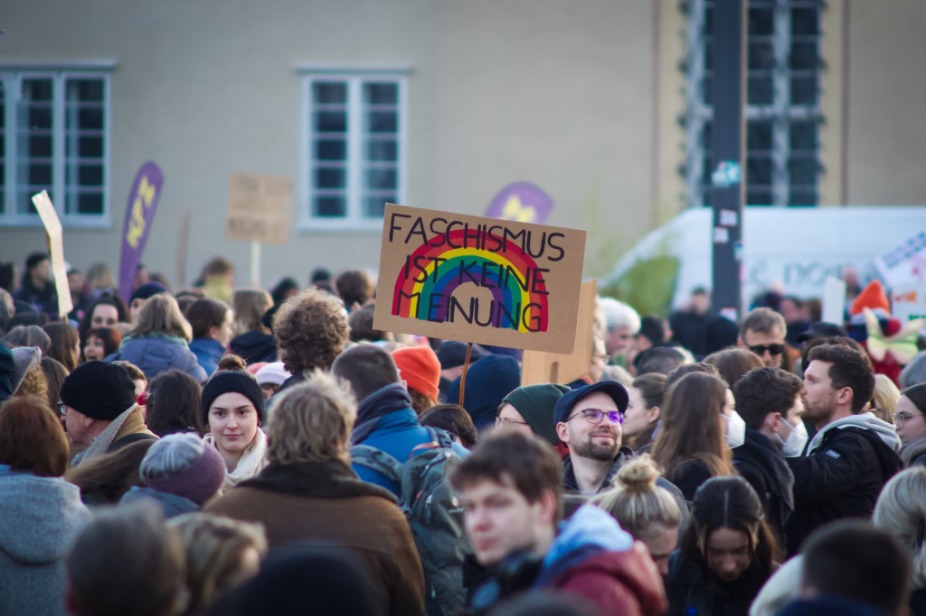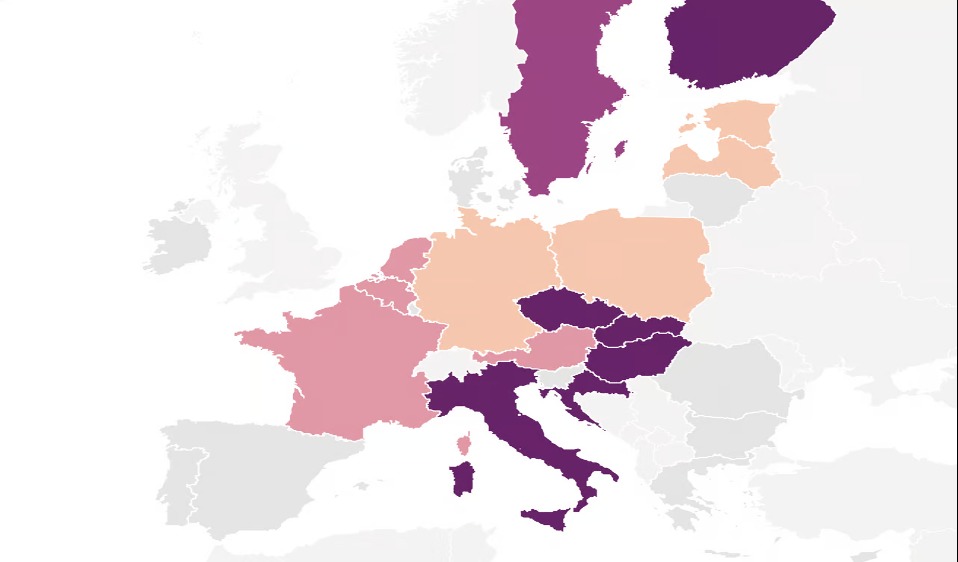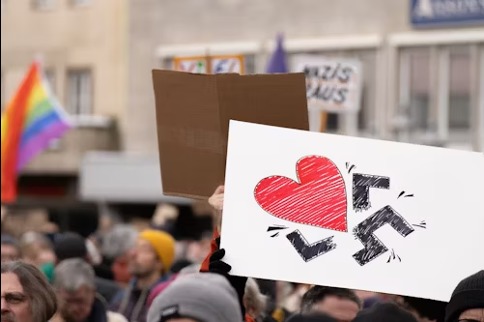Threats to Human Rights: The Impact of Far-Right Rhetoric in Europe's Political Landscape

Laraib Ahmed / GICJ
Introduction
The far-right has long been a part of Europe’s political fabric, dating back to the early 20th century, as movements such as fascism and Nazism left indelible marks on the continent's history. Post-World War II, Europe has struggled with various nationalist and far-right ideologies, and despite periods of decline, these movements never entirely disappeared. These ideologies have been resurgent in the late 20th and early 21st centuries driven by economic uncertainty, social change, and fears of cultural erosion.
Less than 80 years have passed since the end of World War II, and barely three generations have passed. And yet, the European Union, founded on the principle that such a thing should never happen again, is facing its tenth European Parliament elections overshadowed by an unprecedented rise in support for far-right parties in the EU.
A noticeable increase in hate speech and divisive rhetoric targeting immigrants and minorities have marked a notable shift in the political landscape. This shift raises severe concerns about the future of human rights and migration policies across the continent. Human rights groups worry that a right-leaning parliament could impede or reverse advances in some areas, even while centrist parties still have the majority.
During the campaign, far-right parties emphasised strengthening immigration laws, lowering climate change targets, and supporting "traditional" family values. This has led to significant societal impacts. Stricter immigration laws have already resulted in increased deportations and tougher asylum processes, causing concerns among human rights organisations about the treatment of immigrants and refugees. The move to lower climate change targets has sparked criticism from environmental groups, citing increased greenhouse gas emissions and setbacks in renewable energy initiatives. Countries like Germany and Poland have reported an uptick in coal usage as climate regulations loosen, undermining the EU's overall climate goals
How Far-Right Parties Gained Ground

In the countries shaded in light pink, hard-right* parties are in first or second place in the polls, according to POLITICO's Poll of Polls. In countries shaded in purple, these parties are either in government or part of the governing majority.
Economic and Social Factors: The economic downturn, rising unemployment, and a perceived threat to national identities have driven the resurgence of far-right parties. These movements have effectively capitalised on public discontent, presenting themselves as defenders of traditional values and national sovereignty. A decade of austerity policies following the 2008 debt crisis led to social cuts, unemployment, inflation, and job insecurity, eroding trust in European institutions. More recently, the economic impact of international conflicts, the normalisation of far-right rhetoric, and widespread misinformation have further destabilised the region. The far-right has effectively redirected public dissatisfaction with the status quo towards a broader opposition to global immigration, redefining European identity debates.
Political Strategies: In the decades following World War II, far-right groups needed to acquire democratic legitimacy to be accepted. They achieved this by making populism a central tenet of their argum ent. Populism contends that elites taint democratic decision-making and that the people's will should govern. By emphasising populism over extreme ideologies, far-right groups established legitimacy and a democratic reputation.
ent. Populism contends that elites taint democratic decision-making and that the people's will should govern. By emphasising populism over extreme ideologies, far-right groups established legitimacy and a democratic reputation.
Distancing themselves from more radical elements was another attempt by far-right groups to modernise their image. This was often achieved through campaigns aimed at purging radical images, condemning extremist ideologies, and rebranding to appeal to a broader audience. Far-right leaders have employed sophisticated political strategies to broaden their appeal. By framing their rhetoric around issues like immigration and national security, they have managed to attract a diverse electorate, including former supporters of mainstream parties disillusioned by conventional politics.
Media and Propaganda: The rise of social media has played a crucial role in amplifying far-right messages. These platforms provide a fertile ground for spreading xenophobic and nationalist ideologies, often bypassing traditional media scrutiny.
The evolution of media has further aided far-right parties in disseminating their ideas. They can now speak directly with their followers through social media instead of conventional channels. All parties have benefited from this dynamic, but far-right parties, who contend that the media and the establishment overlook regular people, have benefited the most. Because social media offers a direct line of communication, far-right parties are becoming more visible and influential.
The media, especially social media, plays an intermediary role in determining the resonance of far-right discourse. Far-right parties and speakers are particularly appealing to the media because they can successfully recast themselves as fresh political figures and push their central issues. These issues are often portrayed in a way that makes them appear very different from or opposed to the mainstream values and norms of the society they are addressing, which increases their appeal. Such issues are easily sensationalised as being 'alien' to the host society, which amplifies their visibility through media coverage, especially on platforms like social media.
Far-right politicians frequently use inflammatory language to describe immigrants and minority groups. Such rhetoric not only inflames public sentiment but also legitimises prejudice and discrimination. For instance, hostility to immigration has been a leitmotif of far-right discourse for many years. This discourse often frames certain groups as having cultural identities that are supposedly incompatible with liberal values. Hostility to Islam has become another critical element of far-right discourse in recent years. The most successful parties on the far right have externalised their intrinsic xenophobia, claiming that certain groups are the source of intolerance rather than acknowledging any inherent prejudice within their own ranks.
The majority of nationalist and populist movements on the right and far-right incorporate a strong anti-Islam element in their rhetoric, alongside the emergence of new forms of supranational mobilisation rooted in the theory of Europe's 'Islamisation'. These movements typically frame their discourse around several key ideas. They first express concerns over demographic changes, often portraying non-white populations from Southern countries as a perceived threat. This anxiety has evolved since the 1950s, coinciding with Europe's industrial growth and the widening gap in living standards. Furthermore, the growing visibility and institutionalisation of Muslim communities in Europe are used as evidence of an intentional strategy of invasion and cultural replacement. Developments such as the construction of mosques, cultural centres, and the expansion of Halal markets are viewed through this lens rather than as expressions of religious freedom and integration.
The nationalist movements use Islamophobic rhetoric to position themselves as defenders of European progress and civilisation. They argue that Islam poses a threat to values such as women's rights, secularism, and LGBTQ+ rights, which they claim to protect from what they perceive as an antithetical force. The narrative of Islam's perceived incompatibility with European values has become a rallying point for nationalist movements, shaping public discourse and political agendas across the continent.
- In Italy, far-right parties have seen their vote share increase from around 30% in 2013 to nearly 40% in the latest elections.
- Spain has witnessed a rise in far-right populist support, with their share of votes nearly doubling from 13% in 2015 to 25% in 2019.
- In the Netherlands, right-leaning populist parties garnered approximately 16% of the vote in the 2021 elections, a significant increase over the past decade.
- In Hungary, the ruling far-right party secured a supermajority in recent elections, while in Poland, the dominant far-right party increased its vote share fourfold from 2001 to 2019.
These statistics highlight the growing influence of far-right movements across Europe, driven by economic, social, and political factors as explained above.
Consequences for Human Rights
 The consequences of this shift are profound. The increasing acceptance of hate speech and xenophobic rhetoric has led to a tangible deterioration in human rights conditions across Europe. According to Amnesty International, there has been a notable increase in hate crimes across Europe, directly linked to the inflammatory language of far-right p oliticians[3], which has exacerbated social tensions and discrimination.
The consequences of this shift are profound. The increasing acceptance of hate speech and xenophobic rhetoric has led to a tangible deterioration in human rights conditions across Europe. According to Amnesty International, there has been a notable increase in hate crimes across Europe, directly linked to the inflammatory language of far-right p oliticians[3], which has exacerbated social tensions and discrimination.
Migration policies have also become more restrictive and punitive. Some countries have implemented stringent measures to deter migrants, including border walls and harsh detention conditions. These policies violate international human rights standards and undermine the European Union's foundational principles of solidarity and human dignity.
The rise of far-right movements in Europe and the accompanying use of hate speech in political discourse pose a severe threat to human rights and the principles of democracy. As these parties gain influence, their impact on migration policies and social cohesion becomes increasingly detrimental. Former Council of Europe Commissioner for Human Rights Thomas Hammarberg views Islamophobia as a manifestation of the erosion of fundamental human values. These values—such as non-discrimination, tolerance, freedom of thought, justice, solidarity, and equality—are considered foundational to European societies and form the basis upon which the European Union and the Council of Europe were established. According to the 2017 E U Minorities and Discrimination Survey[4], approximately one out of every three Muslim respondents reported experiencing discrimination and prejudice within the past year, with 27 per cent indicating they had been victims of racist crimes.
The pervasive Islamophobia promoted by far-right parties disproportionately affects Muslim women, exacerbating existing inequalities in various domains such as employment, pay equity, and safety. Beyond facing common challenges such as workplace discrimination, Muslim women encounter heightened prejudice due to their perceived religion or ethnicity. Media portrayals and the racist discourse by far-right parties often reinforce stereotypical depictions of Muslim women, presenting them in binary roles—either oppressed or threatening—while overlooking their agency in societal dynamics. Political rhetoric frequently exploits these stereotypes to argue against the compatibility of Islam with European values, further fueling discriminatory attitudes and acts of violence.
Across many countries, Muslim women bear the brunt of Islamophobic hate crimes and speech, particularly if they wear religious head coverings. For example, in the Netherlands and France, a significant majority of reported Islamophobic incidents in recent years targeted Muslim women, many of whom wore visible religious symbols. These systemic prejudices not only undermine the principles of equality and inclusion but also perpetuate a climate where discriminatory practices and violence against Muslim women thrive unchecked.
Addressing this challenge requires a concerted effort from all sectors of society, including political leaders, civil society, and the international community. Only by reaffirming the values of tolerance, human dignity, and solidarity can Europe hope to counter the dark echoes of extremism and build a future where human rights are upheld for all.
Far-right parties have never controlled governments in the majority of democracies. This, however, can change. It is not implausible that far-right voters will back prominent political figures in a few years. Coalitions led by far-right parties may become prevalent in many other liberal countries. This implies that the parties in power will be those whose fundamental beliefs conflict with the principles of liberal democracy. Some countries already demonstrate that the end outcome can be nothing less than the total collapse of liberal democracy.
Geneva International Center for Justice (GICJ) calls upon human rights organisations, policymakers, and the public not to remain passive in this growing threat. It is imperative to challenge hate speech and discriminatory policies, promote inclusive dialogue, and support initiatives that uphold the rights and dignity of all individuals, regardless of their background. By doing so, Europe can resist the tide of far-right populism and build a more just and equitable society.
#Humanrights #Justice #FarRight #EuropeanPolitics #Nationalism #HumanRights #ImmigrationPolicy#HateSpeech #EUelectionss #Democracy#xenophobia #Geneva4Jjustice #GICJ #GenevaInternationalCentreForJustice
[1] https://wwf.panda.org/es/?uNewsID=225651
[2] https://www.chathamhouse.org/2024/06/how-will-gains-far-right-affect-european-parliament-and-eu
[3] https://www.amnesty.ch/de/ueber-amnesty/publikationen/amnesty-report/jahre/2023/air-2023-voelkerrecht-am-scheideweg/state-of-the-worlds-human-rights-embargo-1604x_embargo.pdf
[4] https://fra.europa.eu/en/publication/2017/second-european-union-minorities-and-discrimination-survey-main-results
https://wwf.panda.org/es/?uNewsID=225651
https://www.chathamhouse.org/2024/06/how-will-gains-far-right-affect-european-parliament-and-eu







